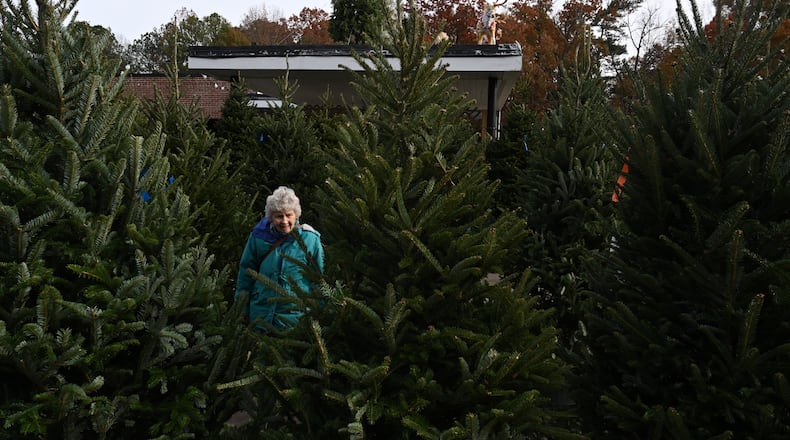Those seeking real Christmas trees have much to be thankful for this year. Christmas tree farmers pulled through a destructive hurricane season with minimal damage and are already filling homes with their freshly scented holiday evergreens.
Tree prices are expected to stay steady, with many farmers reporting their plans not to charge more despite increased production costs, according to the Real Christmas Tree Board’s annual market survey. Last year, the median price of a real tree was $75, the National Christmas Tree Association found.
For some, buying and decorating a real tree is a lifelong tradition.
Lee Culpepper, 82, said she has always had a real Christmas tree — and always will. She picked out a nice 9-footer Wednesday at Tradition Trees in Chamblee. While it does take more time and effort to keep and decorate a real tree and wreaths, it’s worth it for the fresh fragrance, she said.
Credit: Hyosub Shin/AJC
Credit: Hyosub Shin/AJC
“Fake Christmas trees are plastic,” she said of artificial trees. “There’s more vibrancy in things that are alive.”
More people are expected to buy a real tree this year, according to the board’s consumer survey, which found 23% of respondents are going “real” for the first time.
North Carolina is the second-largest Christmas tree growing state in the nation, said Jennifer Greene, the executive director of the North Carolina Christmas Tree Association. While Hurricane Helene’s path of destruction impacted several farms earlier this year, they’ve recovered well and the industry is strong, Greene said.
“Most growers suffered at least some minor losses,” she said. “While every farmer has their own story and their own set of circumstances, overall the impact to the North Carolina Christmas tree industry — it was limited.”
Credit: HYOSUB SHIN / AJC
Credit: HYOSUB SHIN / AJC
The storm damage mostly impacted roads, hindering access to parts of the farms, Greene said. Some farmers lost inventory, mostly through mudslides caused by the massive amounts of rainfall.
“A lot of people have talked about how they were going to buy a real Christmas tree for the first time in a long time because they wanted to support western North Carolina,” Greene said.
Matt Bowman owns Tradition Trees, which buys from other growers across the U.S. and also grows trees in western North Carolina to sell at several Atlanta lots. He said his farm north of Asheville was fortunate after Helene, with no inventory losses, but they weren’t able to access as many 11- and 12-footers as they had hoped, he said. Luckily, 7- and 8-foot trees tend to be the best sellers every season.
Credit: HYOSUB SHIN / AJC
Credit: HYOSUB SHIN / AJC
Consumers have been buying their Christmas trees earlier and earlier in the season, a practice accelerated in 2020 by the pandemic as people were eager to celebrate the holidays.
The same is true this year, as it is for most every presidential election year, Bowman said.
“Whatever side you’re on, you’re ready to not think about politics,” Bowman said. “You just want to kind of move forward and celebrate the holidays. And it is, for so many people, it is the most wonderful time of the year and a time to focus on family and the positive things that you have in your life.”
Plus, Thanksgiving Day fell later in November than usual, less than four weeks before Christmas.
For Georgia Christmas tree farmers, the time crunch between the holidays added pressure to make sales this year, said Chuck Berry, the president of the Georgia Christmas Tree Association.
Luckily, the weather has been perfect for families to spend a day at Berry’s Tree Farm in Covington getting their trees, visiting the petting zoo and taking photos with Santa, he said. Even one rainy weekend can greatly hinder sales.
“With Thanksgiving being a week later this year, we really didn’t know what to expect, but we have sold enough to make up for that lost week of time,” Berry said. “Weather is probably the No. 1 factor in whether you sell them or you don’t sell them.”
While the top states for Christmas tree production are Oregon, North Carolina and Michigan, Georgia ranks in the top five nationwide for pick-your-own tree farms, Berry said. Many, like Berry’s farm, have been in families for generations. But in recent years, more younger families have visited the business, he said.
In the past 10 years, a larger number of consumers have turned to real trees as the more environmentally friendly option over artificial ones, industry experts said.
“Our biggest competitor is the artificial Christmas tree. It’s produced overseas in China in factories,” Greene said. “This is an American-grown product on American soil by American farmers.”
Credit: HYOSUB SHIN / AJC
Credit: HYOSUB SHIN / AJC
Eric and Courtney Vincent have been getting real trees together since they began dating roughly 10 years ago. Courtney grew up with artificial trees, while Eric was accustomed to having a real tree.
“I only have one tradition for Christmas: I want a real tree. That’s the one thing I want,” Eric said. “It feels different without it.”
Their go-to decorating style? Multi-colored lights and an assortment of custom and handmade ornaments they’ve collected through the years. This year, their 2-year-old daughter will get a couple of special ornaments of her own to place on the tree.
“Maybe we’ll start with a non-breakable ornament for her,” Eric said.
About the Author
Keep Reading
The Latest
Featured







